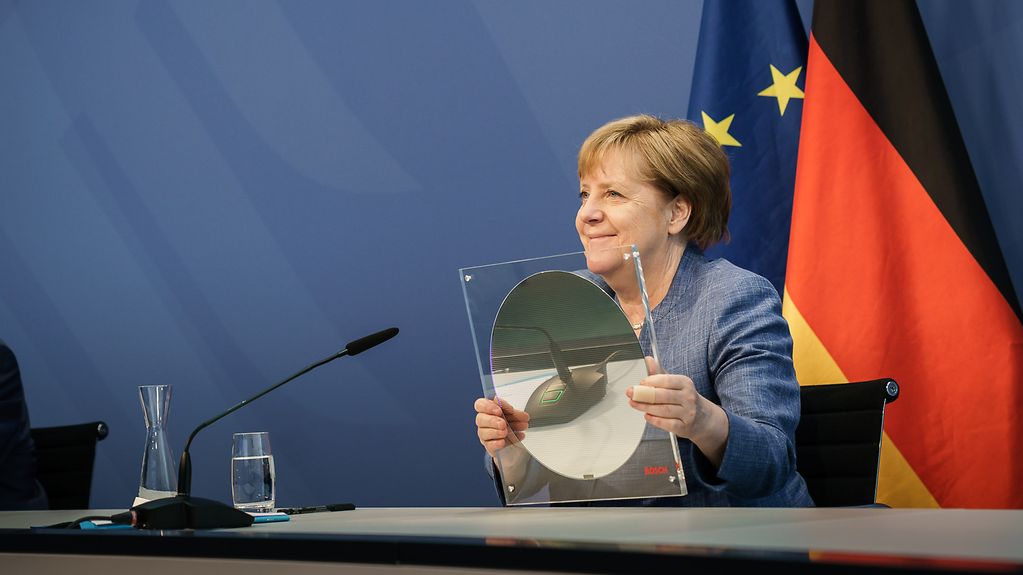Key technology – microelectronics
On Monday, one of the world’s most modern semiconductor factories opened in Dresden. In her video message, Chancellor Angela Merkel described it as an outstanding example of a factory of the future. Today, she said, we are more dependent than ever before on semiconductors – without them, high speed computing power and data processing are inconceivable.
4 min reading time

Chancellor Angela Merkel at the online opening of a new semiconductor factory. The Federal Ministry for Economic Affairs and Energy provided around 140 million euros to support construction of the plant. Production is scheduled to begin at the end of 2021.
Photo: Bundesregierung/Denzel
In future, the most modern generation of chips are to be manufactured in Dresden for countless high-tech applications. On Monday, Chancellor Angela Merkel took part in the online opening of Europe’s first fully connected and data-driven semiconductor factory, and she had her own message. She described the semiconductor factory as an outstanding example of a factory of the future. Today, she said, we are more dependent than ever before on semiconductors. Without them, high speed computing power and data processing are inconceivable. Semiconductors are the foundation for almost every promising technology for the future.
As chips shrink in size, their importance grows
The company Bosch has built a new semiconductor factory that covers an area of about 100,000 square metres. The plant is highly automated and fully connected using 5G technology. The chips are manufactured on silicon wafers measuring 300 mm in diameter. The individual sections within the factory will be started up gradually. The company has scheduled the full production launch for the end of 2021.
“Oil used to be considered the lifeblood of an economy. Today we are more dependent than ever before on semiconductors,” said Chancellor Angela Merkel in her online message. The new semiconductor factory steps up our capacities in the microelectronics sector, she continued. “While chips are shrinking in size, they are becoming increasingly important for our economy, and almost every aspect of our lives. Almost every promising technology for the future builds on microelectronics – artificial intelligence applications, quantum computing and autonomous and connected driving, which is Bosch’s field of special expertise.” The factory sets new standards in fully connected and data-driven production, making it an outstanding example of a factory of the future, delivering chips that are to be used primarily in the field of future mobility, said the Chancellor.
Promoting microelectronics
The construction of the factory is supported by the Federal Government as part of an Important Project of Common European Interest (IPCEI).
The new factory is particularly good news given the chip shortages on global markets since the start of the year. This has led to difficulties in the automobile industry and in other sectors. Many manufacturers have been forced to modify or curtail production.
The shortages are doubtless in part linked to the pandemic, but above all they are a reflection of demand for semiconductor products in the age of the internet of things. It is no coincidence, the Chancellor continued, that we declared microelectronics an IPCEI – an Important Project of Common European Interest. With France, Italy, Austria and the United Kingdom, Germany facilitated public support worth 1.75 billion euros – about one billion euros of this in Germany alone. The Bosch factory in Dresden is one of the central projects that benefit from precisely this support.
Germany is to continue and indeed step up its support for the microelectronics sector. The aim is for Germany and Europe to increase their share of the world market and catch up with competitors in Asia and the USA. Attractive conditions are needed that will attract national and international investors. For this reason, at the start of 2021, the German Federal Government launched a new support programme with a volume of 400 million euros, in order to drive progress in the research-intensive field of microelectronics.
What are semiconductors? Although we cannot see them, semiconductors are in many of the technical devices we use. In the form of microchips they are part of our cars, smartphones and other everyday technical devices, where they perform vitally important tasks. Semiconductor manufacture is a complex process, involving many individual steps. Microchips are increasingly needed in the forward-looking fields of electric mobility and autonomous driving in particular. The Federal Ministry for Economic Affairs is fostering the development of new microelectronics manufacturing plants and products to the tune of up to 1 billion euros.
It is impossible to overstate the fact that the new factory is the largest single investment in the history of the company, said Chancellor Angela Merkel in her video message, praising Bosch. “The sheer size and the additional production capacities of the plant are impressive. The most modern data-driven ongoing production optimisation sets the Dresden plant apart and makes it a smart factory. Or, to put it differently, natural and artificial intelligence form a productive symbiosis here with the internet of things.”
IPCEI on Microelectronics
Under the ongoing Important Project of Common European Interest (IPCEI) on Microelectronics, Germany, France, Italy, Austria and the United Kingdom are working together to uphold and extend European capacities and expertise in the field of microelectronics. For this, they are investing a total of 1.9 billion euros in state funding. All in all, 32 European companies are involved in the IPCEI on Microelectronics. 18 of them have production plants in Germany.